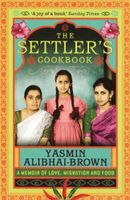Advertisement
Preparation info
- Serves
8
- Difficulty
Easy
Appears in
Published 2009
Ingredients
Method
- Heat the butter at a low temperature in a heavy-bottomed pan with a lid you can put in the oven. Throw in the pods.
- When they start to cook, add the carrots and stir, cooking slowly for five minutes, then add the fresh milk, cover (leave a slight opening) and cook over very gentle heat for ten minutes.
- Check and stir often.
- Add sugar and milk p


